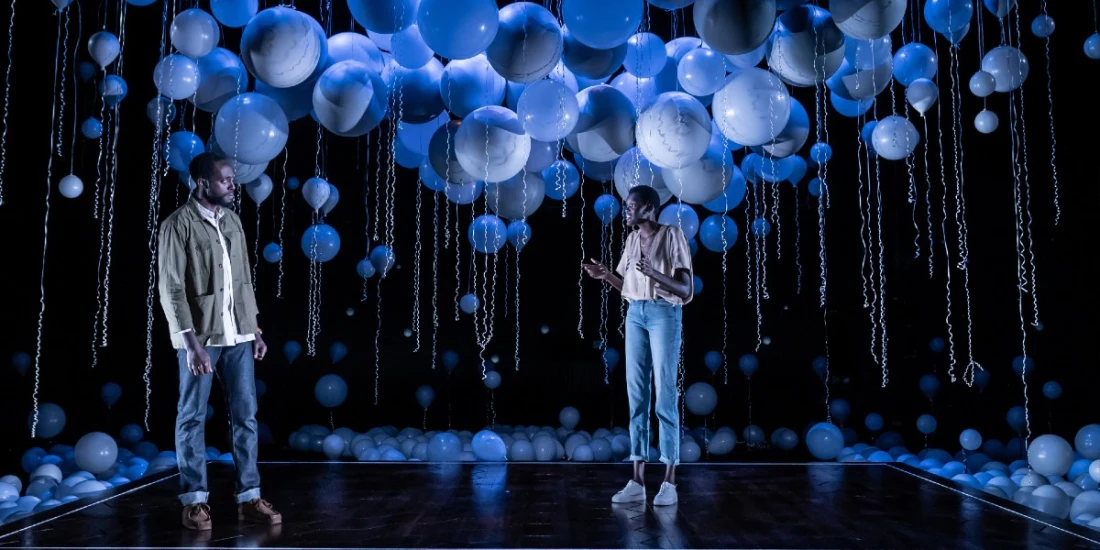Multiple casts bring depth and dimension to the multiverse in 'Constellations'
In 2012, playwright Nick Payne dazzled audiences with his fiendishly clever play that merges relationship drama with theories about quantum mechanics, superstrings, and the multiverse. Now it's back in the West End.
If, after a year of Chris Whitty's "Next slide, please," you're feeling positively allergic to science, fear not: it basically boils down to there being infinite variations in parallel universes — so one in which lovers Roland and Marianne meet, don't hit it off and never see each other again; one where they start dating; one where they break up because she cheated, or vice versa, and so on. Think Tom Stoppard meets Sliding Doors.
Payne illustrates the idea by replaying scenes in different ways. At first it's just a clever exercise, but this 70-minute work soon digs into fate and free will, the roads not taken, and, most profoundly, the everyday miracle that is two people coming together at the exact right time — finding love and happiness amidst a sea of other possibilities.
Of course, a successful piece of theatre likewise has that sense of the stars aligning. Constellations premiered at the Royal Court with Sally Hawkins and Rafe Spall, followed by Jake Gyllenhaal and Ruth Wilson on Broadway. This ingenious revival, by original director Michael Longhust, offers four casts — and yet more variations.
Yesterday, I saw Sheila Atim and Ivanno Jeremiah, followed by Zoë Wanamaker and Peter Capaldi. The setting was the same, framed by Tom Scutt's unforgettable design with light-up balloons (suggesting the titular constellations or synapses firing in the brain). But the drama felt radically altered.
Cosmologist Marianne and beekeeper Roland meet at a barbecue. In the first production, Atim's Marianne is bold and confrontational, wickedly funny, eventually sparking a response in Jeremiah's laidback Roland. Their romance is sexy, turbulent, fast, burning too hot. Atim's brilliant Marianne — clearly something of a prodigy — can't concede control or soften her responses; she's all sharp, jagged edges.

In contrast, Wanamaker's Marianne is a giggly, eccentric chatterbox, who alarms, then baffles, then intrigues Capaldi's prickly Roland. Their connection feels more fragile — the surprise later-in-life meeting, less time to figure it out — and so the play immediately has a wintry, elegiac quality.
In both cases, it's very funny too. Atim bursts out with awkward declarations ("I fucking love honey!"), while Jeremiah has a great line in understated reactions. This pair has the best handle on the rhythms of Payne's play.
Wanamaker isn't quite on top of the dialogue yet, and her swearing feels forced. That's certainly not an issue for Capaldi AKA Malcolm Tucker, and he finds humour in unexpected places — like adding extra indignation when demanding to know whether Marianne's trysts were "spaced out," and in absorbing the information that her lover is just 24. (That, of course, lands differently with the 63-year-old Capaldi and 72-year-old Wanamaker.)
He turns a series of proposals into a Groundhog Day-esque tour de force, at one point grimly advancing on Wanamaker clutching a balloon, and there's an added meta joke in the Doctor Who star fretting that she cheated with a colleague because he doesn't talk enough about space. I'll be fascinated to see how the play morphs yet again with the subsequent casts: Omari Douglas and Russell Tovey, and Anna Maxwell Martin and Chris O'Dowd.
Multiple viewings also allow you to appreciate how ideas that Payne seeds early on pay off in poignant ways. Marianne's conviction that she must have a choice becomes hugely significant, as does Roland's musing on bees' enviable clarity of purpose but curtailed life span. Some of this resonates even more in the pandemic era: our grappling with science and mortality, with a loss of choice and warped sense of what time means. A starry triumph.
Photo credit: Sheila Atim and Ivanno Jeremiah in Constellations (Photo by Marc Brenner)
Originally published on
